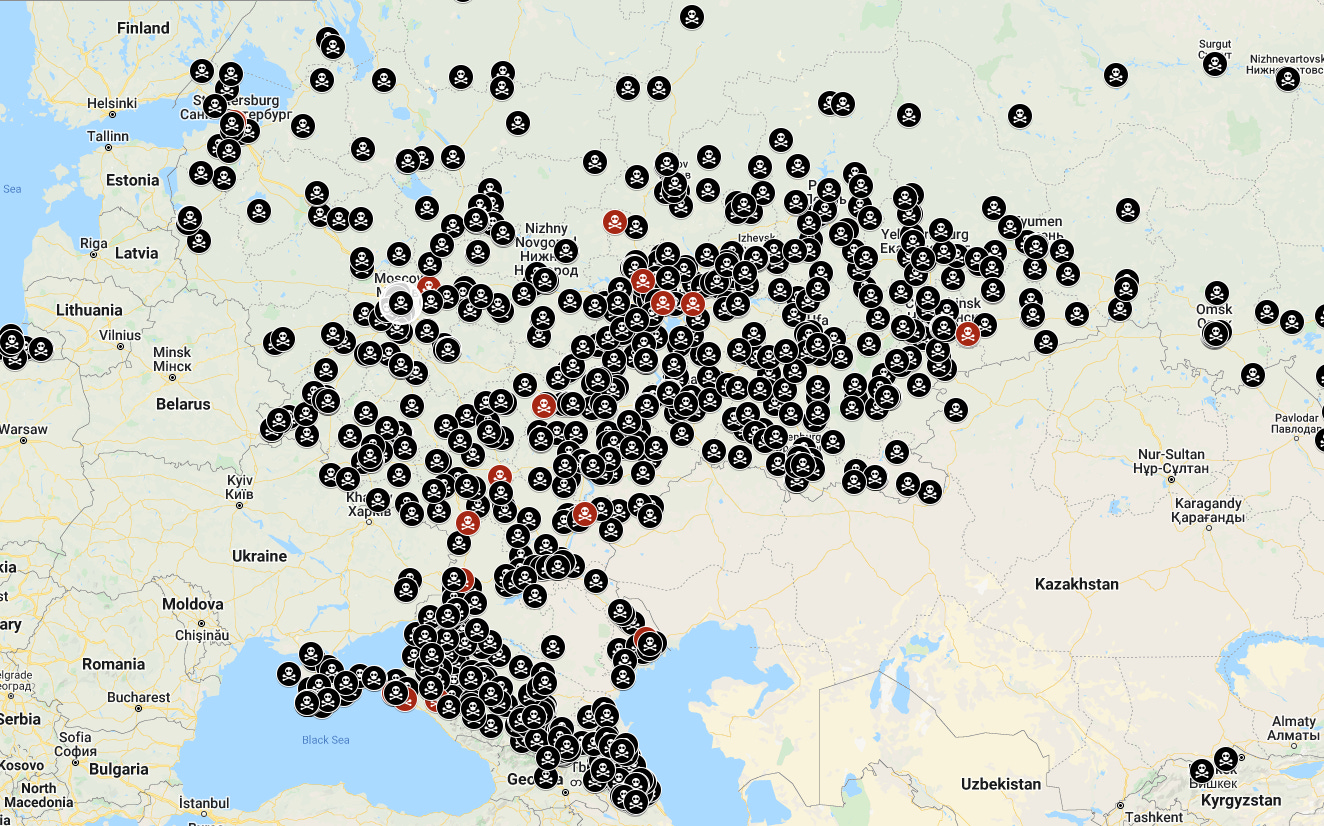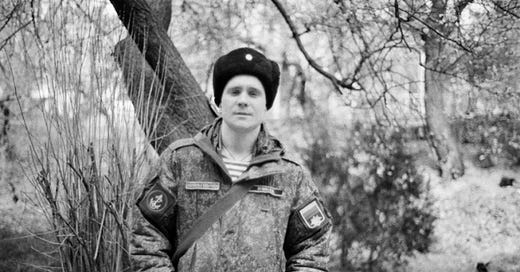Who was the first and only Muscovite killed in the war?
Among 1666 identified deaths in the Russian military, only 1 is from Moscow. It is Ivan Lukin, a poet and a ballet dancer, the son of a writer who was editing volumes of 'Great Patriotic War' poetry.
Or “poet got brainwashed by a vatnik father”. Ivan Lukin’s (05.04.1998, Moscow-15.03.2022, Mariupol) biography is exotic, but symptomatic. While most Russian soldiers are destitute contractors and conscripts, Ivan was clearly driven by ideology. This explains how a Muscovite and not just a regular Russian ended up going to Ukraine and dying there:
As part of the Moscow Region water polo team, he won gold and silver medals at the Moscow and Russia Championships. He graduated from the Nesterovsky Lyceum with a "Gold Medal" and a music school with a red diploma (Moscow Region, Ruzsky District). Scholarship holder of the Governor of the Moscow Region for outstanding achievements in studies and sports.
As a promising actor, he was noticed by directors: he participated in the opera Chaadsky (Moscow Musical Theater Helikon-Opera), in the ballet Nureyev (State Academic Bolshoi Theater of Russia), acted in films. In 2016, with prose publications in various Russian journals, he entered the Literary Institute named after I. A.M. Gorky. In the 3rd year, he went on academic leave of his own free will. In the military registration and enlistment office, he consciously chose the marines. <…>In Mariupol, on March 15, 2022, during a reconnaissance raid behind enemy lines (the area of the Azovstal plant), a sailor of the 810th separate guards brigade of the Marine Corps died Lukin Ivan Borisovich - machine gunner of the reconnaissance company, a talented poet, prose writer and screenwriter, actor, student of the Literary Institute named after A. M. Gorky, member of the Writers' Union of Moscow.<…>
On the morning of March 15, covering the retreat of his unit, Ivan Lukin was hit by a sniper. Lukin Ivan Borisovich presented to the State award (posthumously). The death of Lukin Ivan Borisovich from a sniper's bullet was confirmed by fellow soldiers. Unfortunately, the body of the sailor's guard has not yet been found (the search operation continues). The place and time of the burial of the warrior-hero - Ivan Borisovich Lukin - will be announced later.

Now, a little background. One of the striking features of the Russian military has been the near-total lack of Muscovites. At ~14m, Moscow accounts for ~10% of Russia’s population. The notorious Bucha 64th Brigade has 1648 men, but only two (~0.1%) have Moscow passports. One of the two is an Azeri. Until recently, there was not a single death reported among Muscovites, as documented in Olga Ivshina’s thread. She also explains why the Russian soldiers are like that - as does another thread by Kamil Galeyev.

Things have changed slightly. Two Muscovites were captured - a doctor and a “head sniper” who has been doing fencing for over 10 years. Then another one, Ivan Lukin, got killed. Here are the two POWs, looking unusually civilized and articulate:
But back to Lukin. Here is his father:
Lukin Boris Ivanovich - poet, essayist, critic, translator. Born in 1964 in Nizhny Novgorod (Gorky). Graduated from the Bauman Moscow State Technical University and the A. M. Gorky Literary Institute (poetry seminar by E. M. Vinokurov) In the new century, he edited in the literature department of the Literaturnaya Gazeta, was the deputy editor-in-chief of the newspaper of the joint venture of Russia "Russian Writer", etc. Now the editor-in-chief of the Literary and Drama Part of the Moscow Art Theater named after M. Gorky. His works are constantly published in Russian and foreign periodicals Poems from the books "The concept of a direct path" (1995), "Mesopotamia" (2007), "Longitude of time" (2008), "Duel" (2010), "LeL" (2012) have been translated into many languages of the world. compiler of the five-volume Anthology of Modern Russian Literature "Our Time" (Moscow) and the ten-volume Anthology of Poems about the Great Patriotic War "War and Peace" (Tyumen-St. Petersburg). Laureate of the Great Literary Prize of Russia."
(slightly edited google translate)
The father was clearly extremely invested in the cult of The Great Patriotic War, which has been dominating Russia since the late 2000s. If his credentials are not enough, here is an example of his opinions, a description of a literary event:
In response, the laureate said thanks not only to the Yeltsin Foundation, but also “fi” to the “Donetsk terrorists” who “threaten the happy life of the Russian-speaking population of Kharkov.” It’s as if it’s not Donetsk and Luhansk children and old people who are being destroyed by the Ukrainian “brothers” by the hundreds, but Kharkiv lads and maidens are lying with their legs and heads torn off on the central streets and Maidans of their native cities.
It would be fair if only this Ukrainian guest remembered the “terrorists”. In the end, he has the right to his opinion, but a person can be mistaken.
But the venerable "Russian" laureate, who came to Russia for Our money, called Our Motherland an occupant country (apparently, following the Baltic parliamentarians), and warned us - the "occupiers" - that if we suddenly came to war in the Kharkov region and seized it, i.e. occupy, then the entire Ukrainian people will stop communicating in the language of the occupiers, i.e. Russian, and we will forever become an enemy of people for whom the Russian and Ukrainian languages are a single indivisibility ... and so on, so on ... in the same spirit.
I think that the uncut speeches of the laureates will be published and everyone will be able to compare my transmission from memory with the words they were looking for.
The fact that the audience burst into thunderous applause was a bitter surprise for me. Single cries of “Shame” and response obscene cries of emotional Russian-speaking intelligent women in response to the demand to stop the provocation could not change anything in the overall impression of the “Russian” holiday on Moscow soil.
(slightly edited google translate)
Clearly, Ivan has been subjected to extreme brainwashing from the father, whose entire life was invested in romantisising and promoting the ‘vatnik’ ideology. In a way, the story is a mirror image of the Butusin brothers, except that they came to defend and not conquer, and they have 10 surviving siblings.
I.e., in 2019 he decided to drop out of the literary institute, abandoning three years of study. He joined the military, knowing full well that a war with Ukraine might occur. He went to the war to spread the ‘vatnik’ world, but got shot by a sniper near Azovstal. Now he remains the only Muscovite who died in the war, a tragic example of Russian boomer vatnik brainwashing. Yet he is also a testament to the fact that not many Muscovites seem to have the same ideological outlook - or else he wouldn’t be the only death.



